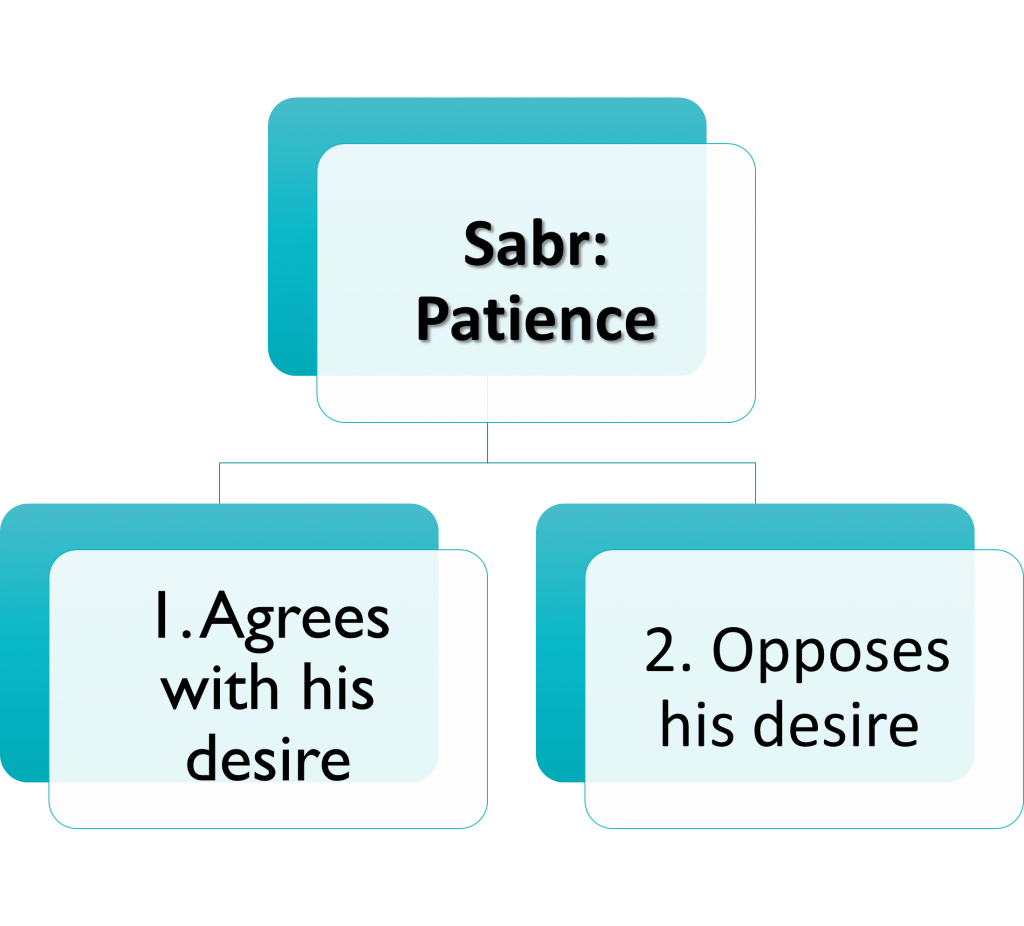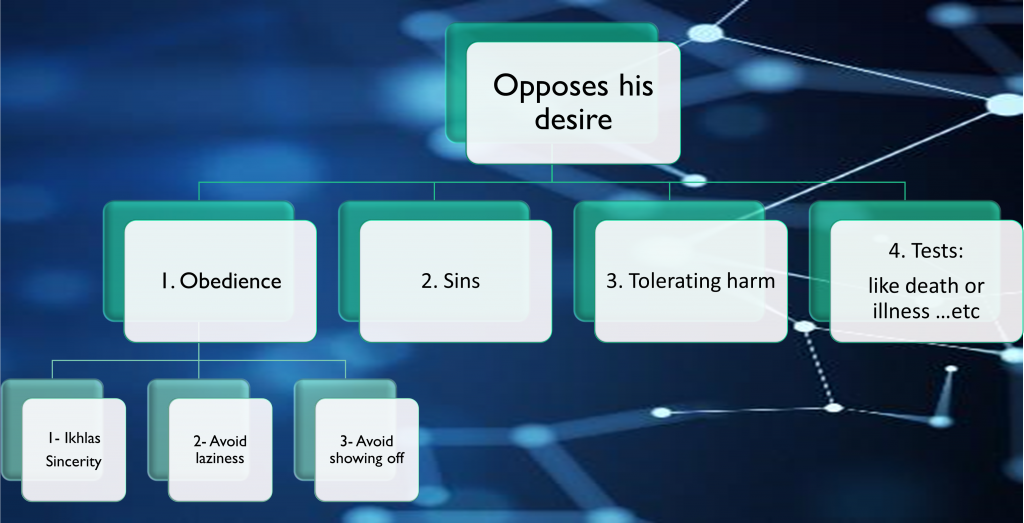Ghazali on sabr (part 2)

Ghazali lived in 5th century Hijri and his book, Kitaab Al-Arba’in Fi Usul ad-Din, ‘The Forty Principles of the Religion,’ which he wrote before his death, is a summary of Ihya Ulumuddin, and his life’s works and thoughts.
In the last ten principles of the forty, he looks at good traits. The first is tawbah. The second is khawf and the third is Zuhd. The fourth quality is sabr. Sabr helps us navigate our journey to Allah safely. Allah Almighty says:
وَٱصْبِرُوٓا۟ ۚ إِنَّ ٱللَّهَ مَعَ ٱلصَّـٰبِرِينَ
be patient. Indeed, Allah is with the patient. (8:46)
Ghazali, in his Forty Principles of the Deen quotes from the Quran, showing the importance of the quality of sabr. Allah has mentioned sabr in the Quran almost 70 times so it appears in the long surahs, short surahs and throughout, because it is a quality everyone requires.
Sabr is the struggle between desire and restraint
Ghazali’s definition of sabr is the conflict between desire and control. When you can defeat your desire, you reach the point of sabr. The motivation of control comes from Allah, and the motivation for desire is fuelled by Shaytan, who tries to hunt us, trap us and trick us at every corner.
Ghazali delineates three levels of sabr – high level is to have full control, low level is to lack control altogether and to be controlled by desire and the middle level is band that the majority of us fall in – in which we keep trying, slipping up, and trying again. Sometimes we are successful and sometimes we fail, but we keep striving and struggling against bad desires. (We are allowed to fulfil good desires in the way that it pleases Allah).

Do we need sabr?
We need sabr in everything we do, though sometimes we do not think we need it, for instance in things that are permissible for us. This is where we forget that we need sabr. When you have sabr or even master it, it gives you a different way of seeing things. The Prophet (peace be on him) said that whoever tries to practice sabr, is given more sabr by Allah. If you do not try to have sabr, you can end up in a position of regret – wishing you had never said or done something. Had you slept on it and thought it through rather than rushed, you would have achieved a different outcome.

Practicing patience in thing you like
Ghazali says in life there are two options – having things the way you like and not having things the way you like. For instance you may dislike living in cold weather or being in the company of talkative people but you might be surrounded by them. Having to put up with what you don’t’ like is an obvious test of your sabr.
However when you have something you desire, such as health, security, wealth or status you also require sabr. This is not obvious to us. How does one practice sabr when one has what one likes? By not overstepping the limits. For instance you should not use your good health to oppress the weak, or your wealth to bribe others and their rights unfairly, or your status to take advantage or exploit or manipulate others.

Practicing patience when you have ease is very important
The Companions said they were tested by having good things and they managed to pass their test where others did not succeed. The test of goodness is sometimes tougher than the test of evil, particularly as one does not realise that they are being tested when they are granted good things.
When you have health, wealth, security, status, family and followers, then you need to have sabr as it is easy to go beyond limits. If you have wealthy and pay your zakat, you may think you are fine, but you can still be tested.
The believer can practice patience in calamities but cannot practice sabr in the status of ease unless he has a high level of imaan, as this requires him to be more careful and cautious.
Just as a driving instructor has extra mirrors to reveal the blind spots in his vision, the siddiq has extra mirrors so he can see the blind spots in his life, which most people do not see in theirs. We need to install these extra mirrors to avoid our blind spots. Blind spots can be dangerous, which is why lorries often have stickers warning drivers behind them that they cannot see them. Thus a person who has been blessed in many ways, may not realise he is being tested at all. However whatever we have been given is a trust from Allah, a loan which He can reclaim from you at any time., so do not forget the akhirah and do not become ungrateful.
How to have sabr when it goes against your desire
Ghazali mentions his own experience supported by different hadith and verses.
As per Ghazali’s usual methodical approach he puts everything in its box, so you know how to deal with it and handle it. He says we need sabr to deal with things which oppose our desire, and be obedient when our nafs is pulling in a different direction, avoid sin, tolerate harm from others, and cope patiently with challenges and calamities like death and illness.

1. Have ikhlas (sincerity) in worship
When it comes to ibadah how does one practice sabr? By correcting your intention (ikhlas), and avoiding riya (showing off). Sometimes we have a double intention when we worship. We are not just worshipping out of obedience but for recognition by others. We need to fastidious about our intention, and ensure that we are not mingling our intention due to the tricks of shaytan and our ego.
2. Avoid laziness – keep the etiquettes and presence of heart
When you are in the midst of your ibadah, then you have to be careful to avoid laziness. Sabr is what keeps you going. When you lose momentum you need to find the motivation to carry on. This is why Allah gave us different times throughout the year to boost us such as Mondays and Thursdays, the white days, Fridays, Eid, Ramadan, Dhul Hijjah, Muharram, Sha’ban and Shawwal. It wakes us up from our autopilot mode and gives us the encouragement to refocus and reconnect with Allah. When we keep in motion, we stay fresh. Otherwise ibadah can go stale and viruses can attack you.
3. Avoid showing off
When you complete your ibadah, you did it perfectly, then your nafs starts telling you how wonderful you are, and how much khushoo you have in your ibadah! You can’t wait to tell someone how wonderful you are. Avoid ruining your salah by allowing shaytan to play you.
4. Sabr against sins – migrate from rebellion to servitude
A muhajir or al muhajiroo is a migrant. Hijra (migration) was made compulsory for all believers after 13 years of revelation. The Prophet (peace be on him) was obliged to move to and reside in Madinah. 8 years after the migration, the conquest of Makkah took place, and migration was no longer necessary.
Migration was a big upheaval for believers. They had uproot themselves, and abandon their homes, families and businesses for the sake of Allah. The true migrant is the one who uproots and abandons evil practices. If you want to receive the reward of the migrant, you have to migrate from a state of disobedience to obedience.
To practice patience against sins is very hard especially when this sin is habitual, and you are immersed in it on a daily basis. If you are in such a condition, you need sabr. When you like that sin, it is difficult to give it up. In this scenario the sin is facilitated by desire and habit, which make it hard to avoid. Unlike a sin which is hard to commit because it requires extra effort. Prophet Yusuf (peace be on him) reached the level of siddiq by resisting temptation. This is why Ghazali is saying you need to practice this sabr in the way that protects you from falling into the same trap again and again. It is not easy, but it is possible.
Sins which involve the tongue are easy to commit because they require very little effort. You can just say something, like a lie or fake prase, which you might regret for years. It would be better practice sabr than say it.
How to tolerate harm without being abused
Ghazali mentioned that you also need to have sabr, when you have to put with something that is not your choice. Someone might be harming you, they may be rude to you, and insult you, so how do you cope with this? We cannot generalise about all these scenarios, which are not under your control. However though you cannot control he scenario, you can control your response.
وَلَنَصْبِرَنَّ عَلَىٰ مَآ ءَاذَيْتُمُونَا ۚ وَعَلَى ٱللَّهِ فَلْيَتَوَكَّلِ ٱلْمُتَوَكِّلُونَ
Indeed, we will patiently endure whatever harm you may cause us. And in Allah let the faithful put their trust. (14:12)
We cannot misinterpret this. It does not work for every scenario. The Quranic guidance is:
The good deed and the evil deed are not alike. Repel the evil deed with one which is better. (41:34)
You can certainly protect yourself and your dignity, but it is better to forgive as the Prophet (peace be on him) did when he had been insulted and humiliated by Quraysh, but forgave them after he conquered Makkah. He could not control their insults, but he could choose his response.
Disregard their harm, and put your trust in Allah. Allah is sufficient as Trustee. (33:48)
وَلَقَدْ نَعْلَمُ أَنَّكَ يَضِيقُ صَدْرُكَ بِمَا يَقُولُون
فَسَبِّحْ بِحَمْدِ رَبِّكَ وَكُن مِّنَ ٱلسَّـٰجِدِينََ
We know you have a tight chest because of what they are saying about you,
So glorify the praises of your Lord and be one of those who ˹always˺ pray, (15:97-8)
In order to escape this tightness in your chest, do tasbih and do sujjud to Allah. This will not work in every scenario, as you may also need to take steps to rectify the situation – such as go to court, call the police, etc. Yet the overriding principle is to act with goodness at all times, without letting yourself be abused.
Ibn Umar reported that the Messenger of Allah (peace be upon him) said:
عَنِ ابْنِ عُمَرَ قَالَ قَالَ رَسُولُ اللَّهِ صَلَّى اللهُ عَلَيْهِ وَسَلَّمَ الْمُؤْمِنُ الَّذِي يُخَالِطُ النَّاسَ وَيَصْبِرُ عَلَى أَذَاهُمْ أَعْظَمُ أَجْرًا مِنَ الْمُؤْمِنِ الَّذِي لَا يُخَالِطُ النَّاسَ وَلَا يَصْبِرُ عَلَى أَذَاهُمْ
“The believer who mixes with people and is patient with their harm has a greater reward than the believer who does not mix with people, nor is patient with their harm.” (Ibn Majah)
Patience can win people’s hearts
When you retaliate to evil with goodness, you move to a level that makes you closer to Allah and can also win people’s hearts, as the Prophet (peace on him) did when he forgave the people of Makkah after his conquest. We need to train ourselves how to react – we need to rise above the ego and the whispers of shaytan. Revenge is not the solution. Repelling bad with good is the Quranic solution, though it is not easy.
We also have to be careful not to be deliberately provoked into having a reaction that is predictable and used against us. If someone triggers your reaction knowing full well what you will do they can get you into trouble. But if react with patience, and manage your strategy better, you can make their plans fail.
Tests and calamities
When we experience illness or loss in business, loved ones or limbs then we have to react with patience. In Surat al Baqarah, Allah Almighty says:
O you who believe! seek assistance through patience and prayer; surely Allah is with the patient.
And do not speak of those who are slain in Allah´s way as dead; nay, (they are) alive, but you do not perceive.
And We will most certainly try you with somewhat of fear and hunger and loss of property and lives and fruits; and give good news to the patient,
Who, when a misfortune befalls them, say: Surely we are Allah´s and to Him we shall surely return.
Those are they on whom are blessings and mercy from their Lord, and those are the followers of the right course.
“And give good news to the patient. Who, when a misfortune befalls them, say: ‘Surely we are Allah’s and to Him we shall surely return.’ Those are they on whom are blessings and mercy from their Lord, and those are the followers of the right course.” (2:153-7)
In the hadith, Umm Salamah narrated that Abu Salamah told her that he heard the Messenger of Allah (peace be on him) say:
“There is no Muslim who is stricken with a calamity and reacts by saying as Allah has commanded: Inna lillahi, wa inna ilayhi raji’un. Allahumma indakah-tasabtu musibati, fajurni iha, wa ‘awwidni minha ‘Truly, to Allah we belong and truly, to Him we shall return. O Allah, with You I seek reward for my calamity, so reward me for it and compensate me,‘ but Allah will reward him for that and compensate him with something better than it.”
We have to train ourselves to say this in any calamity. This should be the automatic response to every calamity we receive.
In the other hadith, every test is recorded in your book and rewarded:
عن أبي سعيد وأبي هريرة -رضي الله عنهما- مرفوعاً: «ما يُصيب المسلم من نَصب، ولا وصَب، ولا هَمِّ، ولا حَزن، ولا أَذى، ولا غَمِّ، حتى الشوكة يُشاكها إلا كفر الله بها من خطاياه».
Abu Sa‘id and Abu Hurayrah (may Allah be pleased with both of them) reported that the Prophet (peace be upon him) said:
“No fatigue, disease, sorrow, sadness, harm, or distress befalls a Muslim, even if it were a prick of a thorn, but Allah will expiate some of his sins thereby. (Bukhari and Muslim)
This is why imaan is half sabr and half shukr. Never complain – you can say you are tired or in pain, but do not say ‘why did this happen to me??!’
The Prophet (peace be on him) also said:
“If Allah Loves a people, He tests them.” (Tirmidhi)
In the hadith Qudsi, the Messenger of Allah (peace be on him) said that Allah, the Glorious and Exalted said:
: عَنْ أَبِي هُرَيْرَةَ قَالَ: قَالَ رَسُولُ اللَّهِ -صلى الله عليه وسلم-: «قَالَ اللَّهُ -تَبَارَكَ وَتَعَالَى-: إِذَا ابْتَلَيْتُ عَبْدِي الْمُؤْمِنَ، فَلَمْ يَشْكُنِي إِلَى عُوَّادِهِ، أَطْلَقْتُهُ مِنْ إسَارِي، ثُمَّ أَبْدَلْتُهُ لَحْمًا خَيْرًا مِنْ لَحْمِهِ، وَدَمًا خَيْرًا مِنْ دَمِهِ، ثُمَّ يَسْتَأْنِفُ الْعَمَلَ». صححه الحاكم، ووافقه الذهبي، وصححه الألباني في السلسلة الصحيحة.
When I afflict My believing servant, and he does not complain about Me to his visitors, I will release him from illness, and I will replace his flesh with a better flesh than his and his blood with better blood than his, and then he will begin his deeds afresh. (Mustadrak Alhakim – Sahih)
Shaykh Haytham Tamim – The Thursday Class
Related posts
Ghazali on showing off (part 3)
Ghazali on showing off (part 1)
Ghazali on how much wealth is sufficient
Ghazali on breaking free from anger
Evils of the tongue 5 – praise
Evils of the tongue 4 – joking
Evils of the tongue 3 – arguing
Evils of the tongue 2- backbiting
The benefits of feeling hunger
Why is following the sunnah the key to success. Ghazali’s secrets part 1
What is wrong with excessive laughter?
Do you have to practice what you preach?
Self righteousness when giving counsel
Brotherhood, friendship and wilayah
How to deal with difficult neighbours
The first 6 rules of how to deal with people
How to deal with people according to their status (9-11)
Cover the faults of others (12-13)
Defend others in their absence, be tactful, be cautious of the company of the rich (16-18)
Recommended Posts

The truth is more powerful than lies
July 26, 2024

Global IT outage. When systems go down…
July 19, 2024

